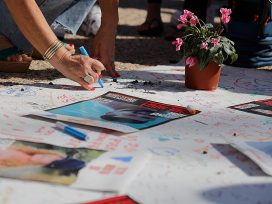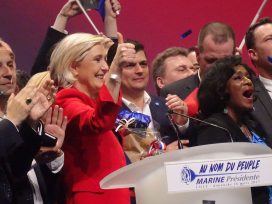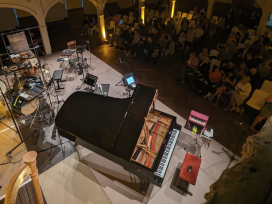
As the end of abundance becomes an everyday experience in Europe, we are thinking more closely about how our food reaches the table.

As the end of abundance becomes an everyday experience in Europe, we are thinking more closely about how our food reaches the table.

Conventional market-led solutions to water scarcity in the Arab Mediterranean, above all mega-projects such as dams, support state agendas and reinforce inequalities in access. Water wars are not inevitable but the result of bad management.

International humanitarian law forbids neither resistance nor self-defence. But it does set strict limitations on any party that engages in armed conflict. Both Hamas’s and Israel’s defiance of jus in bello is an assault on universal values.

Capitalism is no longer a shining beacon: once influential countries are on the verge of becoming third-world economies; developing powers no longer aspire to the West’s visions of progress. Could a viable alternative, avoiding complete environmental devastation, be found in relinquishing fixations on the past and utopian ideals?

Ageing gracefully? Why not age disgracefully instead! Four generations discuss the problem of age, and why women just aren’t allowed to enjoy their time of life, on the first episode of Eurozine’s new venture.

The Pianura Padana is home to a third of Italy’s population and generates nearly half of the national GDP. But over-exploitation, pollution and excessive land consumption are exacerbating the effects of climate change in this politically neglected region.

Marine Le Pen’s mainstreaming of the Rassemblement national involves cutting ties with radical elements and promoting defectors from other parties. The result is an incoherent mix of pragmatism, nationalist demagogy and even progressivism – and a party without a common culture.

Kitchen white goods – ubiquitous modern appliances revered for lightening household chores – are seen as a necessity. The fridge, in taking on bulky proportions, has transformed from basic food storage utility to luxury item. Has what was once practical, yet conceals greenhouse gases, become a guilty environmental consumer trap?

Israel’s devastating response to the Hamas attacks is based on the untenable belief that military supremacy translates into strategic advantage, and that security can only be delivered by permanently suppressing the Palestinians.

Writing is a known tool for healing trauma. And poetry lends itself to rapid responses under pressure. Forced into migrating to flee war, many Ukrainian women turn to the short form as a call of solidarity, a weapon and solace.

In this war, any standards of bellum justum are not worth the paper they are written on. More violence lies ahead, yet escalation is essentially a political choice.

For the second year, Ukraine’s collective consciousness is exhuming mass graves and burying children killed by Russian missiles. While just beyond Ukraine’s borders, the world of the transcendent reigns.

Rivers can be used to combat the risks of flooding or drought, particularly in urban areas. But schemes can impact negatively on the environment and water quality. Opposition to an abstraction system on the Thames throws up the question of natural alternatives.

A democratization of universities must recognize academic institutions as workplaces. Neoliberal principles in German academia are being challenged as a law on fixed-term contracts comes into force.

Many Ukrainian musicians and institutions are boycotting the work of Russian composers, from the classical canon to contemporary pieces. While controversial, extracting scores, often long embedded in honed repertoires, is a deliberate post-colonial act, creating new openings and fresh interpretations on the Ukrainian music scene, at home and abroad.

Until almost the very end, Milan Kundera refused to let his work be translated into Czech or Slovak. Now that is changing, he is being rediscovered by a new generation. Although his wish to return was unfulfilled, his work is experiencing a homecoming.